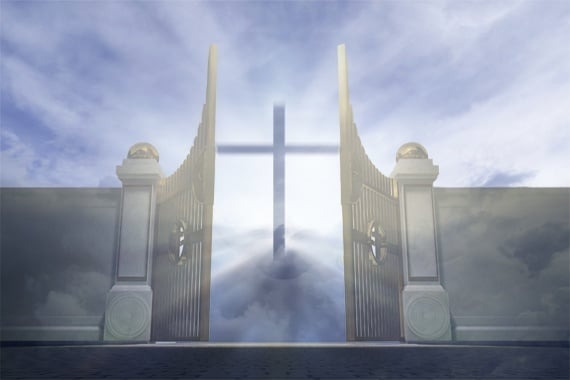See Hank’s special video resource: Hank articulates ten reasons why both the book and film, Heaven is for Real is a dangerous diversion. Click here to view the video.
To read Hank’s related article: Heaven Is Real, but Heaven Is for Real Is Really Not, please click here.
To speak of heaven is not a trifling matter. It is quite literally everything we look forward to and everything we long for. Thus, when people say they have been there and know precisely what it entails, we are all ears. Inevitably we are told that heaven is somewhere up there. If you travel upward from the perspective of Jerusalem (downward from Tonga), we will inevitably encounter the heavenly city. Upon their return, many near-deathers speak of entering the heavenly city through pearly gates and walking on pure gold. But is that true? Is heaven really up there somewhere? Does it really have a street of gold? And if so, how exactly do we get there?
First, from a biblical perspective, we may rightly say that heaven is where God is. When my father died in 1997, we buried his body in a cemetery in Michigan. Not so the nonphysical aspect of his humanity. His nonmaterial spirit is even now where God is. He once prayed, “Our Father, which art in Heaven.” He is now in that very space. The best, however, is yet to come. For one day, “the dwelling of God will be with men, and He will live with them. They will be His people, and God Himself will be with them and be their God. He will wipe every tear from their eyes. There will be no more death or mourning or crying or pain, for the old order of things has passed away” (Revelation 21:3–4). In the meantime, he, along with a “great cloud of witnesses” (Hebrews 12:1), is enjoying the presence of God.
Furthermore, heaven is where we are. Heaven is not a place altogether other than this universe; it is this universe restored. That, ultimately, is the hope of Christianity: the resurrection of our physical bodies, and the renewal of the physical universe. The Easter of earth. The grand and glorious promise of the biblical worldview is that we will once again walk this physical planet. Therefore, when the Bible speaks of “a new heaven and a new earth,” it is describing a universe that, though renewed, stands in continuity with the one we presently inhabit. Put another way, at the second appearing of our Lord and Savior Jesus Christ, this universe will be thoroughly transformed. Though its elements will be destroyed by fire, like a mother in labor, the present cosmos will give birth to a perfect creation. Just as there is continuity between our present body and our resurrected body, so too there will be continuity between the physical universe and the one we will inhabit throughout eternity.
Finally, we might rightly say heaven is where God is and where we are. At present there is, as it were, a veil that separates the habitation of God from the habitation of humanity. In the redemption of all things, that veil will be removed. Christ will then be available to us physically as He is now available to us spiritually. The Shekinah glory that once filled Solomon’s temple will fill the new heavens and the new earth. When the veil is removed, “the earth will be filled with the knowledge of the glory of the Lord as the waters cover the sea” (Habakkuk 2:14). Sacred space will fill our place.
So where is heaven? Is it up there somewhere? A place made of jasper with pearly gates and a street of pure gold? Heavens, no! The language is a heavenly condescension to our earthly inadequacies. The Bible’s descriptions are not intended to communicate what heaven looks like any more than hair “white like wool, as white as snow” is intended to tell us what Jesus looks like. Rather, such descriptions are intended to communicate what heaven is like. As with the golden bowls full of incense (prayers of the saints); the golden lampstands (churches); and fine linen (righteous acts of the saints); so the metaphors describing the heavenly city magnify a far more majestic and glorious reality. A reality far grander than a fourteen-hundred-cubic-mile Jerusalem constructed of jewels and jasper. Heaven involves our earth—these fields, these mountains, these rivers, our place—united as one with God’s space. When the veil is removed, heaven and earth will be conjoined as one. God will walk with us just as He walked with Adam and Eve in the cool of the day.
In light of the biblical depiction of the “new heavens and the new earth,” it is simply incredible to think that Christians willingly accept the paltry substitutes offered up by modern near-death experiencers. Such is the biblical illiteracy of our day! When movies such as Heaven Is for Real supplant the heaven that is real, transformation is sorely needed. I find it tragic that ministries such as Focus on the Family extol this movie, exuding, “Colton’s heaven is assuredly Jesus’ heaven….That’s what the film offers, and it does so in a compelling and sometimes emotional way. What it doesn’t offer is much that will convince theological skeptics—John MacArthur and Hank Hanegraaff among them—that God routinely invites people up into His presence for a visit when they’re at death’s door” (Focus on the Family’s Plugged In, “Heaven Is for Real”; NOTE: Ron Reno, Vice President of Ministry Values at Focus on the Family, has since communicated to me that no slight was intended in these words and they have changed the wording in their review to make that plain).
Let me be clear, this is not about being sensitive to personal criticism—Lord knows I deal with it all the time. Nor is this meant to dismiss a worthy ministry. What ultimately is being criticized is historic Christianity—the faith once for all delivered to the saints (Jude 3)—and that not on a peripheral issue but on the hope of heaven itself. Rather than dismiss theological skepticism, we would all be better served to test this transcendently important matter in light of Scripture, holding fast to only that which is good (1 Thessalonians 5:21).
For definitive discussion on Near-Death Experiences, see my book AfterLife: What You Need to Know about Heaven, the Hereafter, and Near-Death Experiences (Worthy, 2013), in which I answer such question as:
- What is heaven?
- Where is heaven?
- When do we receive our resurrected bodies?
- What will our resurrected bodies be like?
- Will earth be resurrected?









